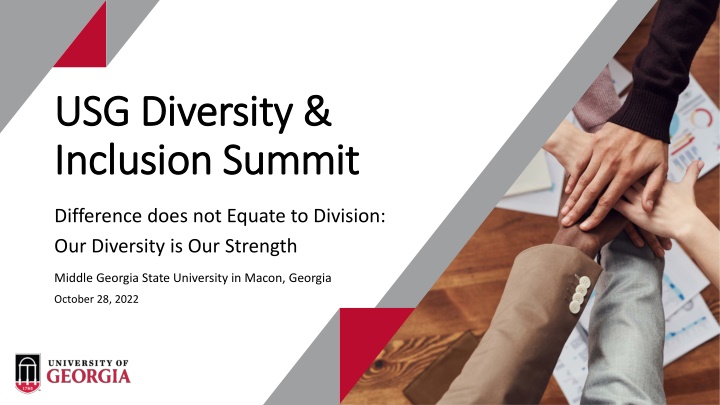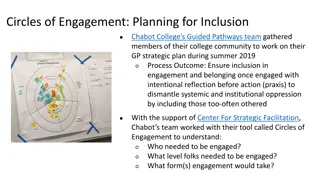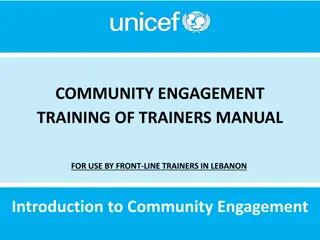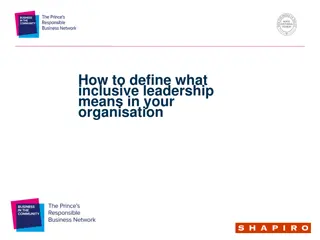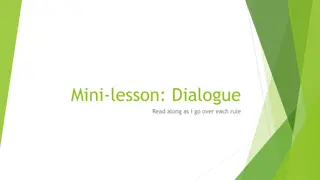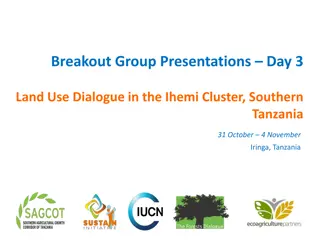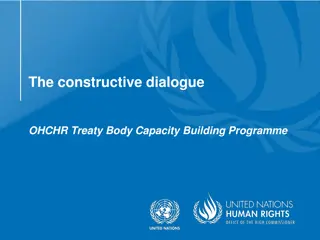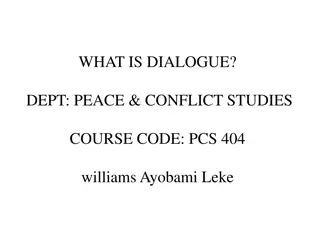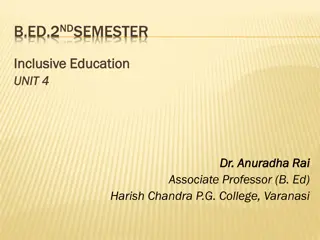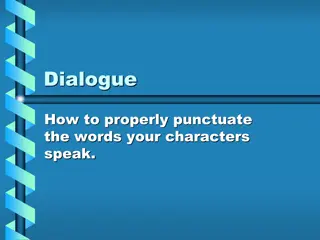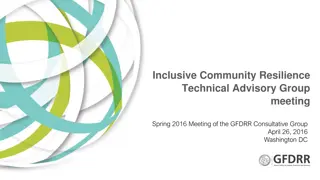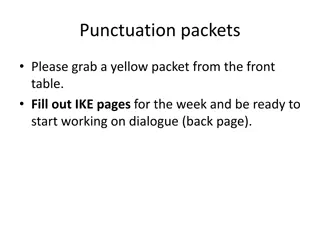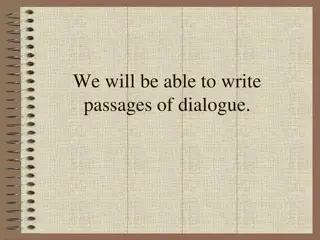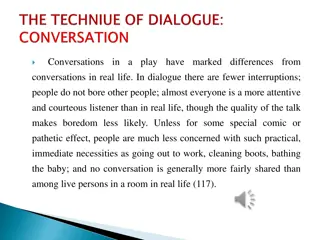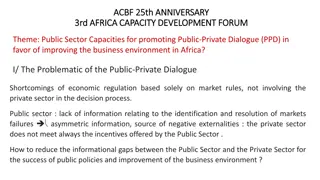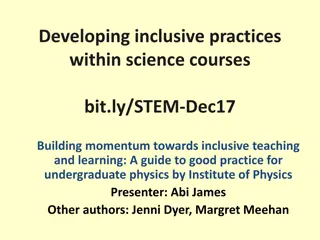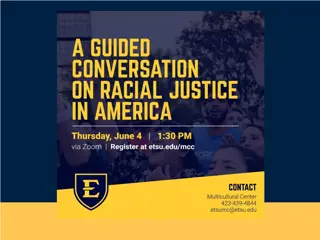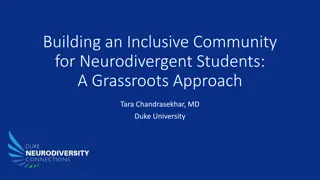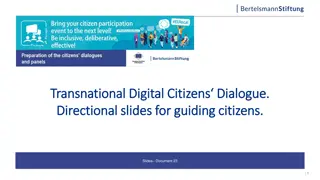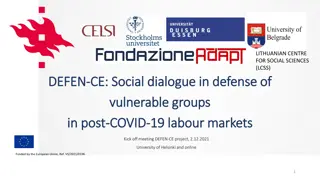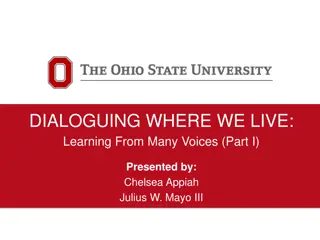Building Inclusive Dialogue for Community Engagement
Leaders face challenges in engaging diverse perspectives, but Reflective Structured Dialogue offers a pathway to mutual understanding, problem-solving, and unity. Creating safe spaces for constructive conversations, this approach fosters peaceful coexistence through respectful exchanges.
Download Presentation

Please find below an Image/Link to download the presentation.
The content on the website is provided AS IS for your information and personal use only. It may not be sold, licensed, or shared on other websites without obtaining consent from the author.If you encounter any issues during the download, it is possible that the publisher has removed the file from their server.
You are allowed to download the files provided on this website for personal or commercial use, subject to the condition that they are used lawfully. All files are the property of their respective owners.
The content on the website is provided AS IS for your information and personal use only. It may not be sold, licensed, or shared on other websites without obtaining consent from the author.
E N D
Presentation Transcript
USG Diversity & USG Diversity & Inclusion Summit Inclusion Summit Difference does not Equate to Division: Our Diversity is Our Strength Middle Georgia State University in Macon, Georgia October 28, 2022
Reflective Structured Dialogue Tool Kit Reflective Structured Dialogue Tool Kit Building a container for conversations & connections Presented by: Raye Rawls, Senior Public Service Faculty J.W. Fanning Institute for Leadership Development University of Georgia
Relationships are necessary for community life. Relationships are created and maintained through conversation. What is silenced can be as destructive as what is shouted. Difficult conversations can become stuck conversations which have self-sustaining properties. Relationships shift when the content and process of conversations shift. What we know Public Conversations Project
Our Purpose Today Our Purpose Today Leaders are faced with unique and disorienting challenges during this time. Finding ways to engage in or convene and lead conversations that challenge our worldview and reflect our differences while allowing us to remain in community. Reflective Structured Dialogue (RSD) is an approach we can use to facilitate a process of engagement that can lead to mutual understanding, a foundation for problem solving, collaboration, and unity indeed, for peaceful and constructive coexistence.
Leaders are obligated to know how to create a Safe- enough (or Brave) Space for Encounter
Building The Container for RSD Building The Container for RSD Clarity on Clarity on Purpose Purpose of the dialogue dialogue Structures of the FACILITATED FACILITATED
Structure of RSD Structure of RSD A series of rounds with communication agreements that work to help participants break unproductive communication patterns Reflect Write Speak Supports listening for understanding rather than listening for an opening to respond
Our Structure Sequenced Questions Rounds 1-3, respond in order Round 4, popcorn-style Participant may pass-specifically not answer the question or pass for now- asking the facilitator to come back to them To create a safe enough or brave space, you must create structure. Helpful for participants to understand: Power of the First Speaker Importance of the Pause
Communication Agreements To create a safe enough space, you must have ground rules.
Communication Agreements Communication Agreements To discourage counter-productive ways of talking: 1. We will speak for ourselves and allow others to speak for themselves, with no pressure to represent or explain a whole group. Our speaking will be based on our own experiences. 2. We will not criticize the views of others or attempt to persuade them. 3. We will listen with resilience, hanging in when something is hard to hear. 4. We will honor time frames so that all voices can be heard. 5. We will not interrupt except to indicate that we cannot or did not hear a speaker.
Communication Agreements Communication Agreements To discourage counter-productive ways of talking: 6. We will pass or pass for now if we are not ready or willing to respond to a question. 7. We agree that what we share within the context of the conversation is confidential, honored and respected. 8. We will resist the urge to debate or persuade. 9. We will avoid making grand pronouncements or speeches. 10. We will listen with curiosity and the willingness to learn and grow. 11. We will not piggyback on what others say.
An Example of My Work A selected group of faculty have agreed to participate in a dialogue. There has been significant upheaval in the department over the past year. Changes The number of women on the faculty for the first time outnumber the number of men. The department has received a mandate from the Provost, via the dean, to develop a plan to address the problems. The department has 90 days to create a document that outlines steps the department will take to carry out this mandate. The curriculum is being updated. New courses and textbooks are being proposed, as are instructional techniques, such as fewer large lecture courses and more on-line courses, more seminars and team- teaching.
Sources of Conflict Women have described some male faculty as stubborn and resistant to change . Charges of mansplaining have been levered. The newer women faculty say they are not receiving the same mentoring support as their male colleagues. Some male faculty have described some of the new female faculty as ignorant of university standards, practices, policies and procedures, and dismissive to the point of disrespect of anybody who upholds these institutional norms. They feel that their academic integrity is being unwarrantably questioned and that they are being accused of sexism whenever they fail to go along. Most of the longtime faculty are older men, some already bordering on retirement age (or past it), and they have expressed anxiety about being sidelined and pushed out because of their age. Some of the older faculty women concur. Tenure-track junior faculty, most of whom are women recently hired, have expressed fears that their tenure applications will not be supported by their older colleagues. What needs to be done about this decline in majors and passing rates? Why is it happening? Faculty cannot agree and, unfortunately, the lines of disagreement appear to also fall along category of gender and age.
At your tables: Please share with the group something interesting or perplexing that you noticed any thoughts about how you might use this approach in your work any questions you have regarding Reflective Structured Dialogue.
Want to know more? Tell us here! Scan the code or go to this URL: https://tinyurl.com/247a5rzv
Thank you! rayerawls@uga.edu
